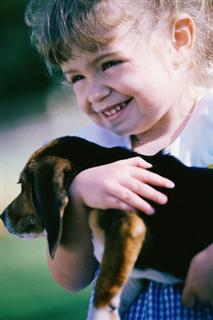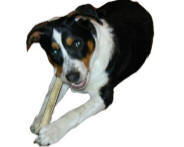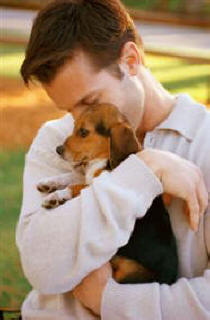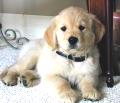Welcome
To Error-Free Puppy Raising™
Wet clay
The first few months of
life for your puppy is like the first five years of
life for humans. Pups develop their personalities
and social skills from the experiences provided.
This is also an optimal learning period up to age 4
- 12 weeks old.
Between 8 and 11 weeks on age, the puppies are more
vulnerable to remember fearful experiences.
Therefore, you must protect the puppy from bad
experiences that might leave a lasting fear into
adulthood.
Timing is
everything
Your puppy
lunges at the cat, you say, "Stop!" and
the puppy sits, then you proceed to tell
the puppy, "No, don't do that!"
Ooops! You have just
reprimanded the puppy for sitting
quietly and looking at you, instead of
praising the puppy for stopping so
quickly in response to your unhappy
voice tone. See how easy it is to
confuse a puppy simply acting like a
human?
You
must interrupt the puppy from
doing what's wrong, and then
immediately praise the puppy for
NOT doing what's wrong any more!
Be a good teacher!
No
spanking or harsh scolding of
any kind! Make learning fun and
rewarding. Remember, to a
canine, the human world is a
foreign language and culture.
Humans are often as clear as mud
to a new puppy!
Out of sight-out
of mind.
Don't allow your puppy
out-of-your sight indoors. It
will be MUCH easier to teach the
puppy what NOT to do if you are
RIGHT there! Prevent bad habits.
If
you can't watch the puppy
indoors, prevent accidents by
confining the puppy in a kennel
or exercise pen outdoors.
Provide comfort, safe toys and
chews.
Caught in the act
If
the pup is "caught in the act" interrupt, gently
with a stern "Ah, Ah, Ah" or "No" then pick the
puppy up, then show the puppy what you DO want,
and praise that! For example, if the puppy
begins to circle and sniff, take him out to the
potty area. If she starts to chew on your
shoe, take her to her chew toy.
Feedback is the
breakfast of champions
 Use
a clicker or praise within 1 to 2 seconds ALL
behaviors you DO want. Couple the sound of a
clicker and praise with a food treat for faster
learning.
Use
a clicker or praise within 1 to 2 seconds ALL
behaviors you DO want. Couple the sound of a
clicker and praise with a food treat for faster
learning.
Treats should be less than 10%
of the puppies daily diet.
The sweetest sound
on earth.
Some
say the sweetest sound on earth is your name
spoken with respect. Make sure your puppy feels
the same way by NOT using your puppies name if
you scold the puppy for any reason.
Instead of saying the
puppies name in a harsh tone to interrupt the puppy,
instead use an instructive reprimand. If the
puppy is barking, say, "Quiet" or "Sit" and then
praise the minute your pup stops barking.
If the puppy jumps on
you, say, "Off." If the puppy is acting hyper,
say, "Down."
Give the puppy something
the puppy knows how to do to earn your praise, THEN
say the puppy's name with praise.
Haste makes waste
If you want a friendly, relaxed adult
dog that is not fearful or aggressive
with all types of people, pets, car
rides, and other every day experiences,
make every experience in the first four
months a lesson.
Truth or
consequences
What your
puppy learns before four months of age
makes a lasting impression.
What gets rewarded will get repeated. If
your puppy does something really cute
like jump up and lick your face, and you
do NOT want your adult to do this, turn
away.
Be careful to watch the behaviors you
may be reinforcing simply by giving eye
contact, smiles, or a loving touch!
It's not fair!
It is not fair to teach a cute, little
puppy that it's okay to jump up and lick
your face, or rest with you on
furniture, if that's not the rule you
want for the adult dog. Your puppy will
remember learning this from you and does
not understand the concept of growing
bigger.
 No
free lunch
No
free lunch
An unemployed canine is
an unhappy canine. The easiest job to give your
puppy is called, "learn to earn everything that you
want."
Begin by using the puppies kibble before feeding
breakfast and dinner. Put the kibble in front of the
puppy. Walk backwards and coach the puppy to
follow the food in a fun-loving voice, "Puppy come!"
Hand feed the first 5 pieces of kibble of each meal.
Move the kibble to show the puppy other positions
such as sit, down, watch, crawl and stand. Make
learning a fun game!
Follow the leader
Your pup will learn
faster from you when he or she realizes that
YOU control everything that the puppy wants. This is easier said than done!
Before you give the pup
ANY privilege such as a meal, walk, toy, passage
through a door (in or out), petting, brushing,
prolonged eye contact, or praise, SIMPLY ask the pup
to do something FIRST such as wait or sit.
When the puppy does what
you want, give the puppy something he or she wants.
It's that simple but it is learning a new habit for
both you and the puppy!
Puppies don't
speak English! 
English is
hard enough for humans to learn let
alone canines! Use one word to always
mean the same thing.
If you want to teach the
puppy to lie down when asked, use one word, "down".
The puppy will learn faster if you use a consistent
hand gesture each time. Don't confuse the
puppy by using the word, "down" when he jumps up.
Instead, say, "off."
Don't say, "down" one time and then say, "lie down"
another. Keep is clear and simple!
It's a salary not
a bribe!
If the pup begins to
eliminate in the home, swiftly pick the pup up and
carry him out to the right area, then praise. As the
pup gets older and wiser, you can begin to phase
food out but NEVER phase out praise or using
privileges as rewards for good behavior. Would you
work if you were never paid?
I think I hear my
mother calling!
What if you
were being called for a spanking instead of being
called to dinner? Would you hesitate?
What if you were never sure if you would be getting
dinner or a scolding? How would you feel?
She loves me,
loves me not
One of the most common
reasons for pups or dogs to stop coming when called
is because they remember being called just before
something bad happened. Canines know they came but
do not know they didn't come quickly enough.
Boo!
If you want to enjoy an
adult dog companion that is not easily scared or
fearful, start now by teaching your puppy that most
sights and sounds are not scary. Introduce
many new things to your puppy with a happy voice and
treat. Show your puppy by example that things
are not scary. Introduce, babies, toddlers, cats,
rabbits, funny hats, umbrellas, hair dryers,
vacuums, fireworks, mail boxes, skateboards,
bicycles, etc.
Never allow your puppy
to panic. Go slowly and keep all learning a
positive experience.
Can I trust you?
Punishment is risky
because it is so likely to confuse the canine and
break the trust in humans. Be on the safe side.
Be the provider of everything good, and nothing that
is scary or bad.
I'll be right
there!
People accidentally
teach puppies to think twice before coming when
called. For example, NEVER call the dog and then
do something the dog doesn't like such as
putting in a bath tub or outside, or scolding for
not coming quickly enough.
Help the dog to learn that EVERY time you call,
SOMETHING good will happen.
English as a
second language
Teach one
word to mean one thing. To teach "come",
begin before a meal with a hungry pup.
Put a piece of dog kibble in front of
the pup's nose, say the pup's name and
"come" in an animated voice. Then move
backwards, keeping the food in front of
the pup's nose. If the puppy jumps you
are holding the food too high. If
the puppy doesn't follow, let the puppy
lick the treat while coming.
The pup has
a natural chase instinct and will
usually follow the food. After a few
steps, give the food and praise.
Do this daily. Keep to
one word. Resist the temptation to embellish, "Come
'ere, come on," or say the same word over and over,
if you want the puppy to respond later to one word.
Huh? One
word - many places
Believe it or not,
puppies need to learn the same word in many
different places and situations or they may only
respond to one word in one place!
After a week or so of the puppy coming to you for a
piece of kibble before a meal in the kitchen, call
the pup from different parts of the house or yard.
He always
does it at home! That's what many families say
in puppy class when they ask their pups to sit and
the puppy looks at them with a confused, "Huh?"
expression. Puppies must be taught one word in
many places before they really "get it!"
Always begin teaching the puppy in a place with no
distractions. Then expand learning to many places.
The Ultimate
Challenge
Save this game until you
are SURE the puppy knows the word, such as "sit" in
many places. Then, see if you can keep the puppies
attention around distracting activity such as other
pets, people, bouncing balls, etc.
For harder lessons like this one, you need to find
an "ultimate reward" that the puppy does not get for
"regular work" and games. Try the big guns - SMALL
pieces warm pieces of warm chicken, hot dog, or brie
cheese.
Ping Pong Puppy
Buddy up with another
family member and call the pup back and forth
between you, giving a treat each time. Think of this
a fun, learning game! After 4 or 5 times, stop
the game to keep the puppies interest.
Think Cheerios!
Thinks
quality not quantity when it comes to
giving your puppy treats. Let the size
of a cheerio be your guide. Think of
food treats as a salary for a job well
done!
Use treats to teach new
games, and vocabulary. A small treat goes a long way
is helping the dog to make the connection between
words and actions. If you puppy won't work for food,
withhold favorite toys as rewards for learning and
doing what you ask.
People first!
The expressions, Treats
should be less than 10% of the puppies daily diet"
and, "age before beauty," are concepts our canines
understand. Canine's consider going through a
doorway first as a privilege of rank.
ALWAYS insist your puppy
wait, and allow you to go through doorways first to
help puppy learn to that you rank respect.
Yes Sir!
In the military, if you
are a Private, you show respect and deference
postures to a Sergeant, and other higher ranking
officers. The military is hierarchy with privileges
of rank. Canines naturally think this way.
Your puppy is constantly assessing who is above me
and who is below me in rank. Who controls the
privileges in this pack? The easiest role in the
family for the puppy is to be lowest ranking, or
Private.
Otherwise, the puppy
will be looking for that "symbolic salute" from
humans and will naturally try to control others.
 Goochie,
goochie, goo!
Goochie,
goochie, goo!
Your puppy will respond
to your body language and voice tone more than to
your words. Dogs read other dogs body language and
understand the tone of vocalizations.
Just like a baby, your
puppy loves this loving, high tone, baby talk with a
big grin on your face, "Oh, you are just the cutest
puppy that ever was!" Like babies, puppies also get
wound up easily when we are, and can be calmed when
we are. Practice this monkey see, monkey do
relationship between you and your puppy.
Dogs are NOT
democratic animals
We tell our children, we love you
all the same, and then try not to show
favorites. This is very democratic.
Canines do not relate to this type of
thinking or behavior. Your puppy wants
to know, who is above and who is below
me in rank.
When we cater to our
canines, showing them with love and affection, we
feel good, even healthier. Unfortunately, if we
don't balance this need to nurture by teaching our
canine companion a clear role, and job in the home,
we may end up with a problem.
One day, we may not give
our dog what he or she demands, and hear a growl.
If we push the point, we may even be surprised by a
nip from our most beloved.
To humans this is
outrageous. To canines it is a natural evolution of
privileges of rank.
Fact or Fiction?

Canines love unconditionally.
This is a myth. We must earn the respect
and unconditional devotion that canines
show higher ranking pack members.
Canines depend on ranking members of a
social group for survival. This
dependence results in behaviors that
look to us like unconditional love. This
is in fact, respect, and a survival
instinct.
However, dogs do show
the same emotions as we do - joy, humor, love,
jealousy, fear, anger, confusion, playfulness, etc.
Our dogs can grow to adore us. But, as most things
this devotion, is not free, it is earned. We must
understand how the canine mind works, and then be
worthy of this love by how we act.
Say what you mean.
Mean what you say.
It's amazing that dogs
learn any human words when their language is so
different from ours. And then, we often make
learning harder by using the same word to mean
different things.
We teach the dog that stay means don't move
from that position - sit, down - until I release you
with a word like, "okay". Then, we leave the
house and tell the day, "You stay here."
Do we really intend the dog to stay frozen in one
position until we return?
Time out!
 Your puppy craves social interaction,
therefore, your attention. If you are
playing a game, and the puppy play bites
your hand or clothing, simply stop
playing, and give the puppy a few
minutes of time out to calm down.
Your puppy craves social interaction,
therefore, your attention. If you are
playing a game, and the puppy play bites
your hand or clothing, simply stop
playing, and give the puppy a few
minutes of time out to calm down.
Praise your puppy for
biting toys not people in play. Don't play tug games
unless YOU both start and stop the game. If your
puppy knows, sit, then use sit as the
password to start the game. This helps keep the
puppies attention on you as a rule maker and the key
to playtime.
Go Fetch!
Not every breed
naturally retrieves or even chases balls. You can
encourage this healthy game by doing the following.
Start with a squeaky toy to get the pups attention.
Throw the toy a few feet away, then call the puppy
in an excited voice. If the puppy comes back with
the toy, do NOT take it. Instead, praise, rub the
puppies back, and then throw a second toy.
The goal is to teach the
puppy how fun it is to chase an object and then
bring it back to you. Over time, you can ask the
puppy to give (the toy) AFTER you make a big fuss
over the puppy for bringing it to you. Trade up by
offering the puppy another toy or treat.
Kennel up!
Its important for your
puppy to have a safe, comfortable place to sleep and
hang out when you are not able to supervise
activities.
Do not put the puppy in
the kennel when the puppy is wound up. Instead,
begin at times when the puppy is tired. Feed one
meal per day in the kennel, then 15 minutes later,
let the puppy out to eliminate.
It's important to
introduce a kennel as the place where all good
things happen. So begin by throwing kibble and
treats into the kennel. Make all toys first appear
in the kennel. Make the most comfortable bed in the
kennel.
If the puppy cries, and
you know the puppy does not need to eliminate, drink
or eat, it is okay to ignore the puppy. Let the
puppy out of the kennel when the pup is quiet.
If the puppy has an
accident in the kennel, you must clean well with
soap and water - not with chemicals.
Who's food is it?
To prevent food bowl
aggression, feed the first few kibbles by hand.
Ask the puppy to sit before you put the bowl down,
then sit with the puppy during meals to get the
puppy use to having people close.
Practice picking up the
food bowl, asking the puppy to sit, and then putting
it back down. During the meal, surprise the puppy
with at least one food treat added by putting your
hand in the bowl.
Morning nature breaks.
Your puppy will learn faster, and feel more relaxed
if the daily schedule is routine and predictable.
For example, take the puppy from the kennel, with no
greeting. Carry the pup out to the toilet area, put
the pup down and act boring. Give a cue, "get busy"
and then continue to act boring.
If the puppy eliminates,
give calm praise and a food treat. If no elimination
after 5 minutes back in the kennel for 5 - 10 more
minutes, then try again.
Routine learning
Your puppy will be more
relaxed if you establish a regular routine. All
playtime indoors must have 100% of your attention.
If the puppy starts to sniff or circle - back out to
go potty!
6:00 am - carry from the kennel to the elimination
area. After elimination, play time indoors.
6:30 am - breakfast in the kennel
7:00 am - back out to the elimination area. After
elimination, play time indoors or walk.
8:00 am - back into kennel with a safe, engaging
chew toy and a ball.
Take your puppy out every 1 - 2 hours during
housetraining to reinforce learning and to prevent
accidents in the house. Always go out upon
wakening and after play!